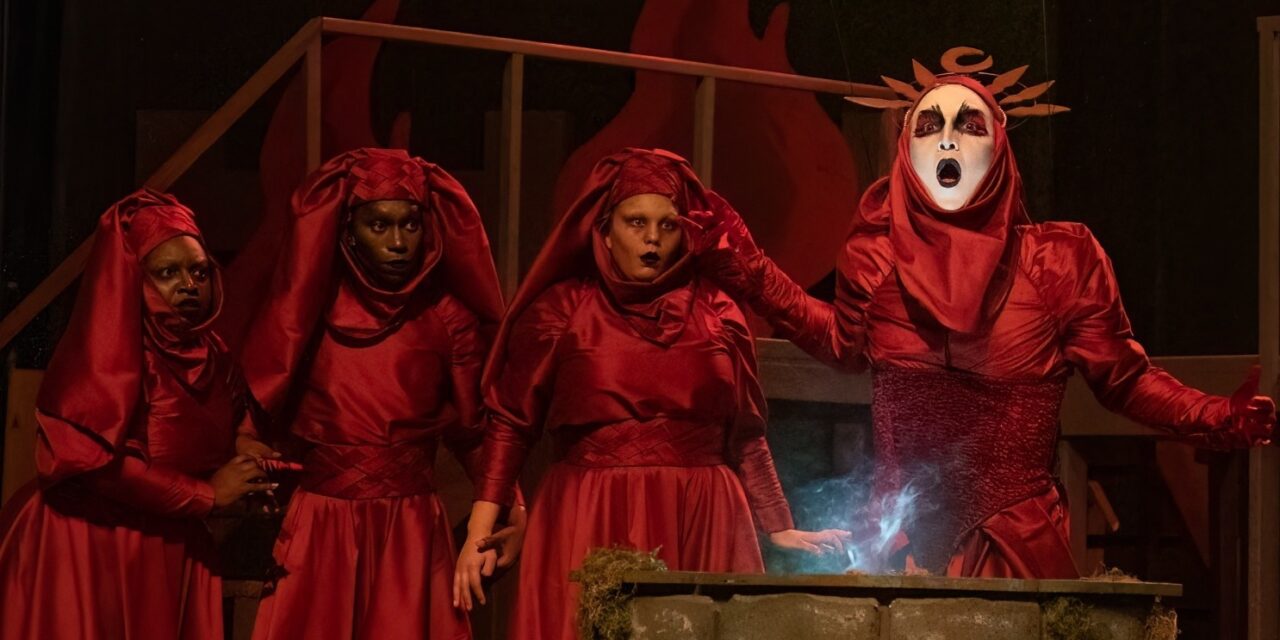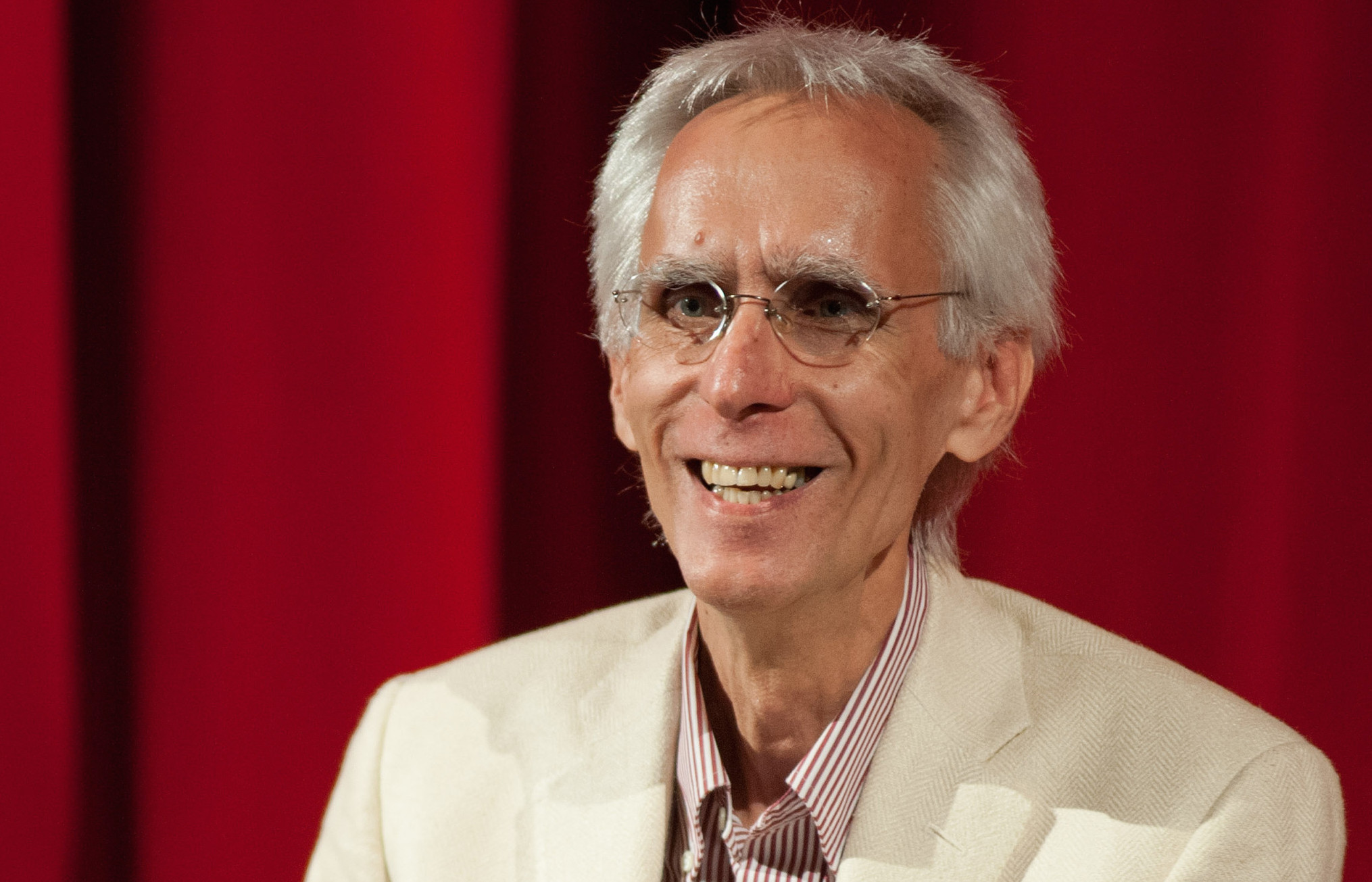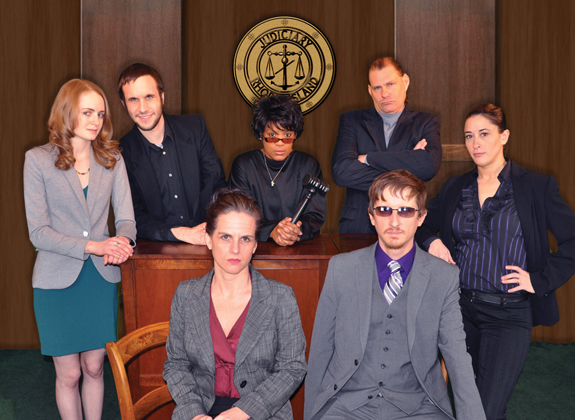Nyazia Martin, Tyler Tate, Sarah Chen Elston, & Neill Robertson in Macbeth. Photo: Bill Brymer
Macbeth
By William Shakespeare
Directed by Amy Attaway
A review by Tory Parker
Entire contents are copyright © 2023 by Tory Parker. All rights reserved.
Swifties will understand when I say this, and since this The Summer of the Eras Tour™ I feel it’s appropriate to point it out, Macbeth is Shakespeare in his reputation Era. I am, of course, referencing a pivotal work by one of our generation’s greatest poets and storytellers, Taylor Alison Swift–the 2017 reputation album. Macbeth, like reputation, is unapologetically HIGH drama, dark and SPOOKY, out for blood, pull no punches, banger after banger after BANGER. The crowd knows it, the fans love it, and if the Macbeths did something bad, then why does it feel so, so good?
Kentucky Shakespeare’s 2023 Macbeth opens on our Weird Sisters. Traditionally the three witches, there is a crucial fourth witch leading the pack. Hecate (Neill Roberston), goddess of the witches, is often cut from productions–a choice which, having seen Roberston’s Hecate, feels not only strange, but downright unfathomable. This is the governess of all our madness, the commander of the moon and overseer of all magic. The story opens with her because it is her hand stirring the literal pot that brings us to our current hour of turmoil, and the second the witches enter the stage in full Bene Gesserit drag with a jaw-dropping moment of stage craft, you know this play is about to Go There.
To set our scene–Macbeth (Zac Campbell-Hoogendyk), seems to be a normal, run-of-the-mill Scottish thane, who (along with his friend Banquo (Kyle Ware)) stumbles upon the witches on his way back from war, and is given a seemingly fortuitous prophecy. He thinks nothing of it until a part of it comes true shortly after–then he is thinking about it a lot.
Campbell-Hoogendyk is a newcomer to the KY Shakes stage, meaning long-time audiences won’t have a familiarity with him as they do so many of the other cast members. For a character as twisty as old Mackers, this can be a real advantage. Campbell-Hoogendyk’s Macbeth starts off charming, mild-mannered, and unassuming; confident but not cocky, everything about him seems harmless. So harmless, in fact, that we’re left wondering how someone like could fall to murdering. What does someone seemingly so content with his general lot in life have to gain from violent ambition?
Enter: Lady Macbeth (Mollie Murk). If Hecate is the overlord of this cacophony, Lady M is her hellhound. Once hearing of her husband’s prophesied kingship, Lady Macbeth commits herself completely to the goal. Any questions we have about this Macbeth are answered in his wife. Murk’s Lady M, more so than any of these soldiers and kings, is of the world of the witches. She is what she implores her husband to be–looking like the innocent flower, but is instead the serpent under it. She desperately wants power, hungers for it in a visceral, bestial way–not in the way that a man might want accolades from a king, but as sluagh needs souls.
I think Shakespeare’s tragic characters fall into two camps: Big Thinkers and Big Feelers. Hamlet, for example, is a Big Thinker. Tortured by his uncle’s betrayal, he schemes and plans his way to his own demise. Romeo (Big Feeler) and Juliet (Big Thinker) meet their end because Juliet’s clever plan outsmarts Romeo’s bleeding heart, and disaster ensues. Macbeth is a Big Feeler. At his best self, his most rational self, he might be a sensible, logical man, but his needy heart is swayed by his wife’s hunger, and by his own desire to be something more than anyone, including he, could have ever imagined. His own betrayal then weighs so heavily on him that he cannot sleep. Ultimately, it is not witchcraft or torture or mortal wound that drives the Macbeths to madness–it is exhaustion, caused by paranoia, a result of their own foul, impassioned deeds.
There were several moments throughout the show that collectively took the audience’s breath away. (And consider for a second, the magnitude of hearing a crowd of 800+ collectively gasp, sitting in the glow of the same stars under which a crowd of similar size might have gasped at the same moment, 400 years ago.) When we see Hecate take flight, when Lady M lets forth her tortured scream at her ever-bloodied hands, the murder of the Macduff family. But Macduff’s (Justin Jackson) hearing of his family’s deaths, that is the moment that stuck out to me. Macduff is a Big Thinker, but in this earth-shattering moment, the weight of loss crushes all logic. Young Malcom (Nick Wills) is screaming at him, imploring him to anger, to violence. But Jackson’s Macduff must “feel it as a man.” He does not yell, he does not tear his clothes or gnash his teeth–he is not of the world of the witches, he is not driven to madness. He feels it, like a mortal wound that, infuriatingly, will not end him. It’s startling and heartbreaking to watch.
This production is one you have to allow yourself to get fully swept away in. It is wicked and decadent–a feast for the eyes, with sumptuous costumes and spine-tingling effects. It feels like a descent into madness. If the fairies of Midsummer are out to cause mischief and revelry, these mad spirits are out for blood. And, in the end, “There will be no further explanation. There will just be reputation.”
Featuring Zac Campbell-Hoogendyk, Mollie Murk, Justin Jackson, Neill Robertson, Kyle Ware, Tyler Tate, Sarah Chen Elston, Nyazia Martin, Gregory Maupin, Nick Wills, Tajleed Hardy, Braden McCampbell, Tony Reimonenq III, Tom Luce, Alfie Jones, Claire Eisenback, Ashley Nicole Cabrera, Jon Huffman, Abigail Bailey Maupin, Jennifer Pennington, Max Wright
Macbeth
June 15-25; July 11, 14, 19, 22 (no performances on Mondays or Tuesdays in June)
Kentucky Shakespeare
Central Park in Old Louisville
Tory Parker, originally from West Virginia, is now a proud Kentuckian as well. In Louisville, she’s worked and/or performed with Actors Theatre of Louisville, Claddagh Theatre Company, the Chamber Theatre, Bellarmine University, Wayward Actors Company, Derby City Playwrights, Company OutCast, Highview Arts Center, and director Emily Grimany. She is a co-founding artist of the queer theatre collaborative, three witches shakespeare. As a playwright, her original works appeared in the National Women’s Theatre Festival in their 2020 and 2021 Fringe Festivals





